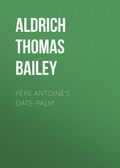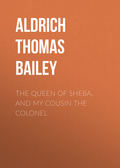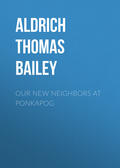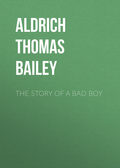полная версия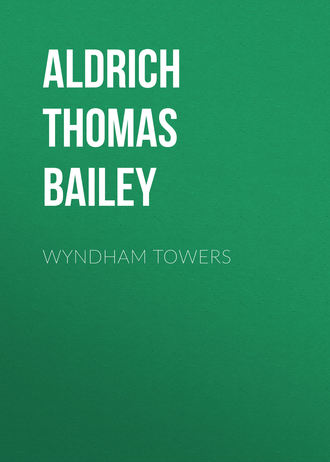

Aldrich Thomas Bailey
Wyndham Towers
At stated rates—so much for a man’s soul!
His was a haughty spirit that bent not,
And one to rise had need to cringe and creep.
So had his brother into favor crawled,
Like slug into the bosom of a rose,
And battened in the sun. At thought of him,
Forgotten for a moment, Wyndham winced,
And felt his wound. “Why bides he not in Town
With his blond lovelock and wench-luring ways—
There runs his fox! What foul fiend sends him here
To Wyndham Towers? Is there not space enough
In this our England he needs crowd me so?
Has London sack upon his palate staled,
That he must come to sip my Devon cream?
Are all maids shut in nunneries save this one?
What magic philtre hath he given her
To thaw the ice that melted not for me?
Rich is he now that at his setting forth
Had not two silver pieces to his purse.
It is his brave apparel dazzles her.
Thus puts he bound and barrier to my love.
Another man were he abused as I…
I’ll have no more of him! If I but dared—
Nay, I dare not. I have fawn’s blood, I think;
I would, and dare not!” Thrice the hooded clock
Solemnly, like some old Carthusian monk
With meagre face half seen beneath his cowl,
Intoned the quarter. Memory went not back
When this was not a most familiar sound,
Yet as each stroke on the dead silence fell
Wyndham turned, startled. Now the sanguine moon,
To clouded opal changing momently,
Rose sheer above the pine-trees’ ragged edge,
And through the wide-flung casement reaching hand
With cold and spectral finger touched the plates
Of his dead father’s armor till it gleamed
One mass of silver. There it stood complete,
That august panoply which once struck dread
To foemen on the sunny plains of France,
Menacing, terrible, this instant stood,
With vizard down and jousting-lance at charge
As if that crumbled knight were quick within.
A footfall on the shingle walk below
Grated, a footfall light as Mercury’s
Disdaining earth, and Wyndham in the dark,
Half crouched upon the settle with his nails
Indenting the soft wood-work, held his breath.
Then suddenly a blind rage like a flame
Swept over him and hurled him to his feet—
Such rage as must have seized the soul of Cain
Meeting his brother in the stubble-field.
Anon came one that hummed a blithe sea-song,
As he were fresh from tavern and brave cheer,
And held the stars that blinked there in the blue
Boon comrades. Singing in high-hearted way,
His true-love’s kiss a memory on his lip,
Straight on he came to unrenowned end
Whose dream had been in good chain-mail to die
On some well-foughten field, at set of sun,
With glorious peal of trumpets on his ear
Proclaiming victory. So had he dreamed.
And there, within an arch at the stair-top
And screened behind a painted hanging-cloth
Of coiled gold serpents ready to make spring,
Ignoble Death stood, his convulsive hand
Grasping a rapier part-way down the blade
To deal the blow with deadly-jewelled hilt—
Black Death, turned white with horror of himself.
Straight on came he that sang the blithe sea-song;
And now his step was on the stair, and now
He neared the blazoned hanging-cloth, and now…
The lights were out, and all life lay in trance
On floor or pallet, blanketed to chin,
Each in his mask of sullen-seeming death—
Fond souls that recked not what was in the air,
Else had the dead man’s scabbard as it clashed
Against the balustrade, then on the tiles,
Brought awkward witness. One base hind there was
Had stolen a venison-pasty on the shelf,
And now did penance; him the fall half roused
From dreadful nightmare; once he turned and gasped,
Then straightway snored again. No other sound
Within the dream-enchanted house was heard,
Save that the mastiff, lying at the gate
With visionary bone, snarled in his sleep.
Secret as bridal-kiss may murder be,
Done was the deed that could not be undone
Throughout eternity. O silent tongue
That would blab all with silence! What to do?
How hide this speechless witness from men’s gaze?
Living, that body vexed us; being dead
‘T is like to give us trouble and to spare.
O for a cavern in deep-bowelled earth!
Quick, ere the dusky petals of the night
Unclosing bare the fiery heart of dawn
And thus undo us with its garish light,
Let us this mute and pale accusing clay
In some undreamed-of sepulchre bestow,
But where? Hold back thy fleet-wing’d coursers, Time,
Whilst we bethink us! Ah—such place there is!
Close, too, at hand—a place wherein a man
Might lie till doomsday safer from the touch
Of prying clown than is the spiced dust
Of an Egyptian in his pyramid.
At a dark alcove’s end of that long hall,
The ancient armor-room in the east wing,
A certain door (whereof no mortal knew
save Wyndham, now that other lay a-cold)
Was to the panels of the wall so set,
And with such devilish shrewdness overlaid
By carvings of wild-flower and curled grape-leaf,
That one not in the favor of the trick,
Albeit he knew such mechanism was,
Ere he put finger on the secret spring
Had need of Job for ancestor, in faith!
You pressed a rose, a least suspected rose,
And two doors turned on hinge, the inner door
Closing a space of say some six feet square,
Unlighted, sheathed with iron. Doubtless here
The mediaeval Wyndhams hid their plate
When things looked wicked from the outer wall,
Or, on occasion, a grim ruthless lord
Immured some inconvenient two-faced friend—
To banquet bidden, and kept over night.
Such pranks were played in Merrie England then.
Sealed in the narrow compass of that cell,
Shut from God’s light and his most precious air,
A man might have of life a half-hour’s lease
If he were hale and well-breathed at the start.
Hither did Richard bear his brother’s corse
And fling it down. Upon the stone-paved floor
In a thin strip of moonlight flung it down,
And then drew breath. Perhaps he paused to glance
At the white face there, with the strange half-smile
Out-living death, the brightness of the hair
Lying in loops and tangles round the brow—
A seraph’s face of silver set in gold,
Such as the deft Italians know to carve;
Perhaps his tiger’s blood cooled then, perhaps
Swift pity at his very heart-strings tugged,
And he in that black moment of remorse,
Seeing how there his nobler self lay slain,
Had bartered all this jewel-studded earth
To win life’s color back to that wan cheek.
Ah, let us hope it, and some mercy feel,
Since each at compt shall need of mercy have.
Now how it happened, whether ‘t was the wind,
Or whether ‘t was some incorporeal hand
That reached down through the dark and did the thing,
Man knoweth not, but suddenly both doors,
Ere one could utter cry or put forth arm,
Closed with dull clang, and there in his own trap
Incontinent was red-stained Richard caught,
And as by flash of lightning saw his doom.
Call, an thou wilt, but every ear is stuffed
With slumber! Shriek, and run quick frenzied hands
Along the iron sheathing of thy grave—
For ‘t is thy grave—no egress shalt thou find,
No lock to break, no subtile-sliding bolt,
No careless rivet, no half loosened plate
For dagger’s point to fret at and pry off
And let a stifling mortal get to air!
Angels of Light! what were a thousand years
Of rankling envy and contemned love
And all the bitter draughts a man may drink
To that half hour of Richard’s with his Dead?
Through silence, gloom, and star-strown paths of Night
The breathless hours like phantoms stole away.
Black lay the earth, in primal blackness wrapt
Ere the great miracle once more was wrought.
A chill wind freshened in the pallid East
And brought sea-smell of newly blossomed foam,
And stirred the leaves and branch-hung nests of birds.
Fainter the glow-worm’s lantern glimmered now
In the marsh land and on the forest’s hem,
And the slow dawn with purple laced the sky
Where sky and sea lay sharply edge to edge.
The purple melted, changed to violet,
And that to every delicate sea-shell tinge,
Blush-pink, deep cinnabar; then no change was,
Save that the air had in it sense of wings,
Till suddenly the heavens were all aflame,
And it was morning. O great miracle!
O radiance and splendor of the Throne,
Daily vouchsafed to us! Yet saith the fool,
“There is no God!” And now a level gleam,
Thrust like a spear-head through the tangled boughs,
Smote Wyndham’s turrets, and the spell was broke.
And one by one, on pallet stretched or floor,
The sleepers wakened; each took up afresh
His load of life; but two there were woke not,
Nor knew ‘t was daybreak. From the rusty nail
The gateman snatched his bunch of ancient keys,
And, yawning, vowed the sun an hour too soon;
The scullion, with face shining like his pans,
Hose down at heel and jerkin half unlaced,
On hearthstone knelt to coax the smouldering log;
The keeper fetched the yelping hounds their meat;
The hostler whistled in the stalls; anon,
With rustling skirt and slumber-freshened cheek,
The kerchief’d housemaid tripped from room to room
(Sweet Gillian, she that broke the groom his heart),
While, wroth within, behind a high-backed chair
The withered butler for his master waited,
Cursing the cook. That day the brewis spoiled.
That day came neither kinsman to break bread.
When it was seen that both had lain abroad,
The wolf-skins of their couches made that plain
As pike-staff, or the mole on Gillian’s cheek,
The servants stared. Some journey called them hence;
At dead of night some messenger had come



